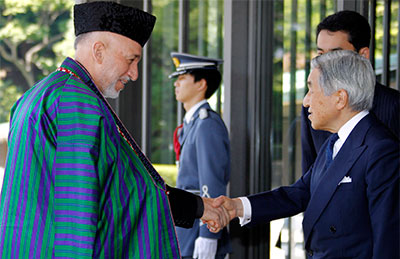One thing that had better be high on the agenda this weekend at the meeting of 70 or so international aid donors for Afghanistan in Tokyo is the recently released official draft version of the Mass Media Law (a copy of the draft can be found here). I mentioned the new draft in a June blog, “Afghan media is under political and economic pressure.” The real thing is even worse than expected.
Whatever aid money is agreed on this weekend is supposed to be contingent on the Afghan government commitment to attacking the country’s endemic corruption and upholding and improving human rights standards–something the draft media law does not seem terribly concerned with.
The proposed new law will go in front of the legislature with little or no advice from the vibrant Afghan media community that has grown up since 2001, said Danish Karokhel, the head of Pajhwok Afghan News, who was the lead-off topic in that June 11 blog. He told me overnight that the best tactic the Afghan media community can come up with is, “Stop it from getting to Parliament.” One positive of the 2009 law now in effect was that local media were involved in its construction. Karokhel said he believes that if the new draft ever does become law, anti-media MPs (of which there are many) would seek to make the restrictions even worse, either before it is passed or later, with amendments.
Here are some of the concerns I’ve been hearing from Afghan journalists:
- The number of journalists on the non-governmental Mass Media Commission would be significantly reduced.
- The information and culture minister would sit at the head of an unnecessarily complicated group of bodies regulating the media, ruling as the director of a High Media Council. He would be vested with vast regulatory powers that could be enacted by decree.
- A powerful new Media Violation Assessments Commission, with a predominance of government representatives, would be established, along with special media prosecutors and courts for civil cases regarding media issues.
- The government would have much wider power to limit foreign broadcast programming–just as foreign influence would wane with the 2014 NATO troop drawdown and the government could swing to a more conservative political approach. Bollywood movies and Turkish soap operas are widely popular, but even their modest standards may be too racy for the post-2014 Afghanistan.
And, as Human Rights Watch mentioned this week in their analysis of the draft, “Afghanistan: Draft Law Threatens Media Freedom
Even the word choice of media outlets would be controlled by the government. Print media and websites would be required to observe a “guideline of phraseology and orthography which has been determined by an authorized committee according to an approved procedure by combined board of High Media Council, High Council of Ministry of Higher Education, Academic Council of Ministry of Education, and High Council of Academy of Sciences of Afghanistan.”
Also, the draft includes no mention of establishing guidelines for safety training or professionalization of the press corps–two pressing issues that must therefore be addressed at the upcoming Tokyo donors’ meeting.
Which brings us to another issue: International aid donors and the sustainability of Afghan media. The Center for International Media Assistance published a report, “An Explosion of News: The State of Media in Afghanistan,” in February. It points out that only a small number of news organizations will be able to survive in a commercial, free market. The majority still depend on support from international aid donors or powerful business, political, and militant groups within Afghanistan. (Some of these are called “Warlord TV,” though there are plenty of print outlets that could come under that title too.)
Agence France-Presse reports that donors in Tokyo will pledge $15 billion, which is supposed to carry through 2015. If that sounds like a lot of money, Reuters captures the reality in a story today, “As foreign aid dries up, Afghan NGOs fight to survive.” And when you think “media” in Afghanistan, for the most part you still have to think of NGO or foreign government support.
On Monday, William Byrd, who has spent much of the last 10 years organizing conferences like that coming up in Tokyo, wrote on Foreign Policy‘s AFPAK Channel “When too much is not enough,” about the “plethora of high-profile international meetings, occurring with increasing frequency in recent years” introducing the concept not just of donor fatigue but “meeting fatigue.” The first on Byrd’s list of recommendations is “keeping to realistic expectations about what meetings can accomplish.”
Maybe one realistic expectation for Tokyo is that the international community can pressure the Afghan government into reassessing its proposed regressive changes to media law, and at least insist that Afghan journalists and media owners be given a large voice in determining just what new laws will look like.
